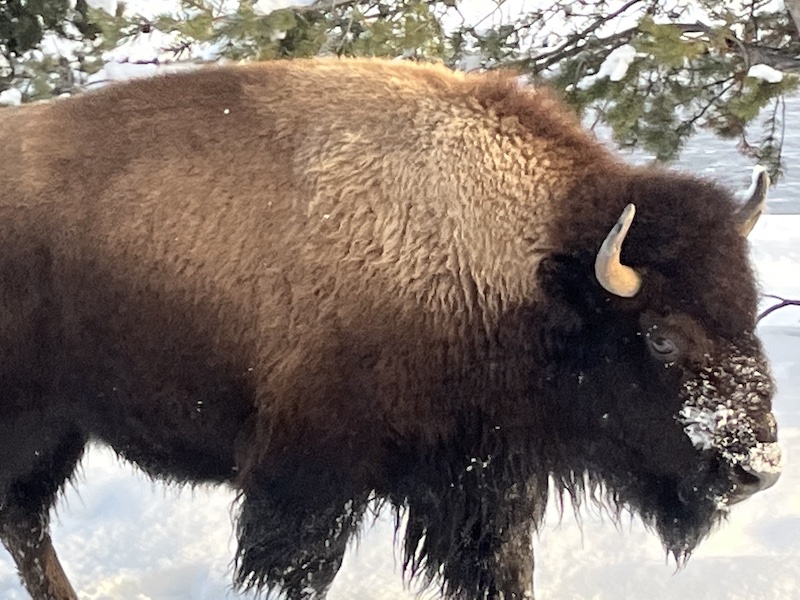
Tyson the Bison
That, according to the signs in the Madison Campground bathroom, was the name of the bull hanging around in the campground. The signs prompted campground residents to be aware of his presence so as not to accidentally get too close. Even docile-looking bison are dangerous—fleet of foot and quick to anger. He was an older bull, and typical of his peers, he’d left the herd and the sparring for status and mating rights in favor of a quieter life.
In the words of the campground host, Tyson is “like other bulls of his age. They go off alone. When they get older, being alone is easier than dealing with the drama of herd life.”
It makes sense. It’s a little tempting because even for people, being alone seems easier than dealing with the drama of the human version of herd life. At least, it makes sense until you consider the final words of his statement: “And that’s how they meet their end.” Young or old, it’s no way to live. And no way to meet our end.
It’s true on the trail and true in Life
Maybe you’re like me. Maybe you sometimes wonder if life would be easier without the drama that comes with close proximity to others. Here’s the thing about staying with the herd: there’s safety in numbers. The number of what the National Park Service calls bear encounters has increased during the forty years I’ve been visiting Yellowstone. So has the number of park visitors, and the number of bears. But—and this is important—the number of encounters decreases in relation to group size.
A hiker alone looks vulnerable. A hiker in a group does not. It’s true on the trail and true in life. This is why hiking in places like Yellowstone has so much to teach us about walking by faith.
That evening when my husband and I were hiking in the Bechler Region—an area known for an abundance of waterfalls and bears–we slipped into silence on the trail. (Read the whole story here.) With my mind occupied by the setting sun and the potential for bears, I didn’t have much to say. If I had been alone, I would simply have hightailed it back to the vehicle in silence, forgetting that silence on the trail is dangerous. But I wasn’t left to my own devices. I was in the company of my husband, and he wisely steered us toward the safety of sound—and not just any sound. He suggested the sound of praise.
Peter is clear. We have an adversary. He’s prowling around, seeking someone to devour. We’re living—walking every day—in enemy territory, and we’re more vulnerable alone than in company.
We probably all have a favorite biblical phrase about fellowship. Two are better than one. Iron sharpens iron. Encourage one another day after day. Maybe yours is different, but it likely points in the same direction: we need to live in fellowship with living, breathing human beings. This, friends, is hard, in all kinds of ways.
- Sometimes it’s hard to find your people. (Don’t give up.)
- Sometimes it’s hard to find the time. (If you can’t find time, consider how to clear it, or maybe claim it. Or reclaim it.)
- Sometimes it’s hard to open up to others. (Practice with small steps.)
- Sometimes we don’t know what to say. (It’s okay to listen.)
Dealing with the drama of herd life is worth it. We’re walking in lion territory. We need one another. Let’s not walk alone.
Pay Careful attention, then, to how you walk—not as unwise people but as wise—making the most of the time, because the days are evil. Ephesians 5:15 – 16
🧭 Ponder this: Are you walking alone? What do you need to do to shore up your connection with iron-sharpening friends?
happy trails ~ Natalie 🥾
This is the fifth post in the Are You Prepared? series. Click to read parts one, two, three, and four.
I often join with the writers at these links.
I’m so grateful for those I’m able to walk with through this journey. You’re right that we should not attempt walking alone. Companions make everything better.
You are so right–companions make everything better!
Natalie, this is just beautiful. Tyson had much wisdom to share 🙂 Herd life can be full of drama we may want to avoid. Yet we need one another more than we realize. This has been a wonderful series!
Thanks so much, Joanne. I appreciate your encouraging words. Tyson did share some wisdom, didn’t he?
I love this! The herd life is so important! Thanks for linking up with Grace and Truth!
Thanks for your kind and encouraging words!
Oh, the rigors of herd life! Feeling this post in my bones—and yet I know that my sanctification depends on the sandpaper of life on life encounters to teach me that I am not the center of the universe!
Oh, how I love how you phrased that, Michele. Like you, I feel it in my bones. And, I too, need regular reminders that I am not the center of the universe.
I needed to hear both of these encouragements to walk wisely, Natalie, “When they get older, being alone is easier than dealing with the drama of herd life.” And, “He wisely steered us toward the safety of sound—and not just any sound. He suggested the sound of praise.”
God uses wild places like Yellowstone to share subtle lessons for walking wisely. I’m always so grateful for them.
Tyson, is beautiful and regal. This is a wonderful message with a poignant lesson. so wonderfully spoken.
visiting today from Anita’s (#1)
Beautiful and regal indeed. One of my favorite things about Yellowstone is the quiet lessons for navigating life by faith.